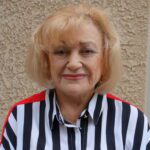
Mary Sterina (Belarus)
I was born on March 22, 1941, in Gomel, Belarus, three months before the war began. Because I was just three months old, everything I write comes from my mother, Lyubov Romanovna Ginzburg. She was a shift supervisor at a textile factory at the time and a member of the party.
In 1939 my mother’s brother fell and was killed by a tram in Leningrad, leaving behind a wife and two young children. So my mother, who was on three months maternity leave, took in her brother’s older child, five-year-old Ilyusha. Since my mother was involved in evacuating a factory to the Urals after the war began, me, Ilyusha, and my eleven-year-old brother Victor went with her.
The train moved slowly and made many long stops. There was nothing to eat. The children climbed along the platforms and on the wagons. Once, they found a whole barrel of anchovies, which was a real holiday! My mother ate anchovies, drank water, and breastfed me.
We arrived at Chkalov (now Orenburg) after several weeks travel. There, my mother turned over the equipment she had been put in charge of. A very nice older woman took us into her home on the outskirts of the city. Perhaps she wasn’t so old, but that’s how it seemed to me. We called her Anna Fedorovna. She would babysit me and let my mother go to work.
My mother’s aunt and uncle found us and settled in as well. My mother left the knitting factory for a factory that made pasta, where she would sometimes glue dough to her stomach, bring it home, bake it and feed us bread. My uncle was a shoemaker and my aunt saved all his money, so when they returned to Gomel she bought a house that was a duplex with a large orchard. After they left, my mother gave Anna Fedorovna my stockings and asked her to sell them to buy bread for us. I ate poorly, even when food was available. My mother sought out her half-sister, Fenya, who arrived at our house wearing a dress made from a bag with three holes cut in it for her arms and head. She had a son three years older than me. She’d had a heart defect since she was a child, and my mother would not let her work. Only my mother worked.
My father returned after the war ended, where he’d been wounded. His real profession was tailoring, so he built a shop and we lived generally well. My brother graduated and applied for medical school when I was in the first grade. He was an excellent student and a Stalin Scholar. I was thin and feeble, and often sick.
My mother also cared for the disabled. She too care of a blind man who wanted to move to another city who demanded that the executive committee transfer his twelve-square-meter room to my mother. We now had our own home. But to return to Belarus was impossible because we had no money and there was nowhere to go there.
A college professor who taught the cello lived in an even larger room in our building. He’d once even taught Rostropovich. Nikolay Ivanovich, as we called him, treated us with such respect, and even offered to switch rooms with us. He lived alone, and my mother always tried to help him. This is the very room my parents exchanged in order to move to Minsk.[1] By this time I was nineteen years old and didn’t live at home.
After I completed school, I went to Belarus and attended a commercial college. My parents returned while I was in my second year. Years after the war, in Orenburg, we read a newspaper article that described my mother’s train trip to the Urals as a “feat,” yet she never received an award. Even when she requested permission for a communist party food basket, she was denied. They said they‘d do it when she was a party member for 50 years. She didn’t live that long.
My father was terribly ill. He survived three heart attacks, but died when he had a fourth. My mother was alone. She became sick as well, and retired at 52 with a disability. My uncle’s wife survived the blockade in Leningrad with her youngest son, and after the war reunited with her oldest son, Ilyusha. My older brother Victor became a respected surgeon. He died in February 2010, at the age of 80.
